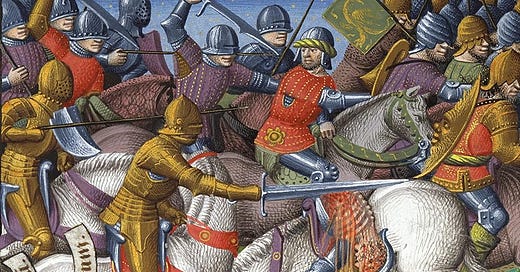If you are looking for the beginning of the study for The Song of Roland then you can go HERE for a brief introduction. At the bottom of the introduction you will find the links to each section of the study guide as it becomes available. If you would like to see the growing list of book studies available for free on this site you can go HERE. Enjoy!
Virtues/Vices/Great Ideas: (Find them in the Text)
Grief, Cowardice, Courage, Decorum, Despotism, Salvation, Despair
Grammar Questions: (The Information of the Text)
What did Aude (Oliver’s sister and Roland’s betrothed) do when she learned Roland had died?
Whom did Carlon summon to himself at Aix?
To what charge did Ganelon confess and what charge did he deny?
What excuse did Ganelon give for his actions against Roland?
What did all of the barons of Charlemayn’s domain, except Thierry, tell Charlemayn he ought to do with Ganelon?
What did Thierry say Charlemayn should do with Ganelon?
How did Pinabel intervene to defend Ganelon?
How did Ganelon’s family intervene to defend Ganelon?
Who wins the duel and how?
What was the fate of Ganelon and his family?
What was the fate of Queen Bramimond?
What was the fate of Charles (Charlemayn)?
Logic Questions: (Interpreting, Comparing/Contrasting, Reasoning)
Why were Charlemayn’s promises to Aude “meaningless” to her?
Why did Charlemayn call all of the barons of his kingdom to judge Ganelon rather than just pronouncing judgment against him on his own?
Why did Ganelon believe himself to be innocent of treason?
Why did the non-French barons think Ganelon should be freed?
What was the purpose of putting up hostages for the duel?
What is meant by the statement, “Treason destroys itself and others too”?
Why did Queen Bramimond receive a new name?
Why did the poet choose to end the poem with Charlemayn being called back to war?
Rhetoric Questions: (The Analysis of Ideas in the Text)
How should we define the concept of decorum? How do we see the idea of decorum in this reading? Do you believe it is important to observe rules of decorum? Should we observe them even when dealing with an enemy? Explain your answers carefully.
Is it appropriate to torture a person to death if they have been found guilty of a great crime (such as Ganelon who was responsible for the death of thousands of Frenchmen)? Why or why not?
Theological Analysis: (Sola Scriptura)
Read Genesis 9:4-6 and Exodus 21:12-32. What principles concerning the death penalty should be drawn from these texts? How does this relate to our present reading in The Song of Roland.



